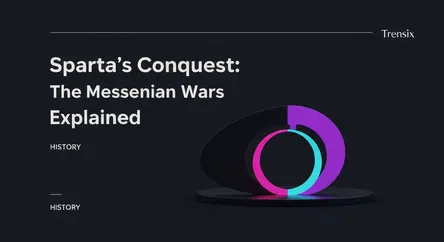History
Sparta's Conquest: The Messenian Wars Explained

Discover the Messenian Wars, the brutal conflicts that enabled Sparta's rise and condemned the Messenians to centuries of servitude as helots.
What is it?
The Messenian Wars were a series of conflicts fought between the 8th and 5th centuries BCE, primarily between the neighboring Greek city-states of Sparta and Messenia. Motivated by a need for fertile agricultural land to support its growing population, Sparta launched an invasion of the resource-rich territory of Messenia. The First Messenian War (c. 743-724 BCE) resulted in a decisive Spartan victory. Sparta conquered Messenia, annexed its land, and reduced the native Messenian population to a state of hereditary serfdom known as helots. Subsequent wars were primarily large-scale revolts by the oppressed Messenians seeking to regain their freedom from their Spartan masters.
Why is it trending?
The Messenian Wars remain a topic of significant historical interest because they were fundamental in shaping the unique character of Spartan society. The constant threat of a massive helot uprising, as the Messenians vastly outnumbered their conquerors, forced Sparta to restructure its entire state around military readiness and brutal suppression. This led to the creation of the famously harsh and disciplined militaristic culture for which Sparta is known. The story of the Messenian struggle for freedom against overwhelming odds also provides a timeless narrative of resistance against oppression that continues to resonate.
How does it affect people?
The wars had a profound and lasting impact on both populations. For the Messenians, defeat meant the loss of their freedom and homeland for over 300 years. They were forced to labor on the lands they once owned, giving half of their produce to their Spartan masters and living under a constant state of terror. For the Spartans, the conquest was transformative. It provided the economic foundation for their society but came at the cost of cultural and artistic development, dedicating all societal resources to maintaining military dominance. This created an intensely militarized state where every male citizen was a soldier, tasked with controlling the subjugated helot population.